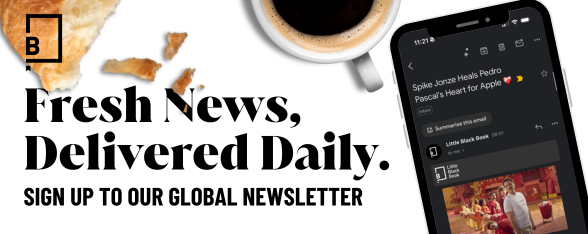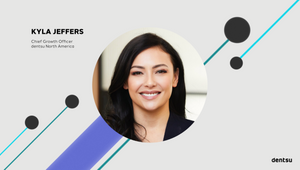
Data Brewing: Ab InBev’s Luiz Barros on How Data and Fast-Paced Creative Thinking Helped the Beer Giant Navigate Covid-19

Testing, testing, testing. Covid-19 turned the world’s biggest brewer into a giant creative laboratory. The teams realised they’d have to move fast to respond to a constantly shifting landscape and that their consumers were finding themselves in completely unknown territory. Figuring out how to most effectively leverage their size to help society and respond to a changing world was not something that Luiz Felipe Barros, VP of AB InBev’s Data Center of Excellence, was keen to leave to guess work.
Instead, teams around the world started putting out frequent small-scale pilots, testing them out in the world with consumers to figure out what ideas were having the most impact and what creative thinking was worth scaling. It’s an experience that has totally transformed how the brand works with data, helping them put out creative projects with real impact. With greater internal transparency around data, teams are also able to have a clearer picture of the social impact that their campaigns and projects are having – taking the guesswork out of the great purpose debate too.
With transformative ideas like Tienda Cerca (a platform created to connect independent bars and corner stores with consumers, that has rolled out to nine Latin American countries) , a gift card scheme to support locked down bars that has raised £20m and spread to 20 countries, and a rousing experiential campaign Courtside, which allowed basketball fans to share their support with players via giant screens, AB InBev has a wealth of proof points for this fast-paced, agile, data-driven approach. They’ve picked up a few Cannes Lions for them too recently, including the Grand Prix for Creative eCommerce and a Gold Lion in Media.
LBB’s Laura Swinton caught up with Luiz for a deep dive on what it really means for data to power creativity.
LBB> How did data help you navigate the shifts that happened during the pandemic?
Luiz> First of all, the pandemic and everything that happened last year created a big disruption not only for us and the industry but for consumers overall. From one day to the next, people suddenly couldn’t travel, meet their friends and family or go to the venues that they liked. Even the way they entertained themselves radically changed.
One thing that was really important to us at AB Inbev was first to ensure that we could guarantee the safety of our teams from the breweries to the offices. Secondly, how could we use our reach and breadth to help society. Data played an amazing role in this for us. It helped us put the consumer at the centre and restructure all our communication and everything we did.
One of the big things we did was to start an internal process to invite ideas – it started as ‘ideas for good’ and evolved into ‘ideas for growth’. On a weekly basis, markets would come to us to pitch ideas – but instead of big campaigns costing millions of dollars, it was small, niche things that we could test and pilot. That allowed us to test what would resonate with consumers and drive a bigger impact for society and our business. We were all facing a new reality and no one had the answers, nobody would know what would work. So instead of spending millions, we’d put a few thousand into a pilot, test it, validate it in real life. With the pilots that achieved the results we’d set out, we’d start to pour in more money to scale them and replicate them in other countries.
The moment we brought everyone together into this process, we needed to be able to measure the results and track the data in a more efficient way. And more than that, we had to democratise access to data. Every week, we’re approving five to ten campaigns that would be tested live the following week.
LBB> Is that where the Cannes eCommerce Grand Prix-winning idea Tienda Cerca came from?
Luiz> Tienda Cerca was an initiative that started in Colombia, the idea of creating a website that would allow people to find bars and grocery shops that were open but that didn’t have a delivery service before Covid-19. They didn’t have a way to maintain their business, so we thought we’d create a direct contact between the consumers and businesses and at the same time we provided bicycles so that people working at the shops could deliver to people’s homes. It was really successful in Colombia, we got millions of visitors. Long story short, we extended it to eight other countries in the Americas. We have more than 400,000 stores and bars connected to this platform.
In Ecuador, the president of the country used our platform to announce and distribute food baskets for people in need. This was one of almost 100 initiatives we tested around the world.
Another one, from the UK, was about helping bars that were closed and so not making money. They couldn’t pay rent or employees, so we started a platform where people could buy giftcards. The revenue went straight to the bar and restaurant owners and you can redeem the gift cards after they reopen. At the same time, we would match the amount, to ensure that the bars and restaurants would be able to survive.
This was extended to over 20 countries around the world, and if I’m not mistaken, we raised over $20m for small bars and restaurants.
Another thing we did was use the alcohol we extract when making zero alcohol beers to make hand sanitisers. We’re doing that in over 20 countries around the world, producing millions and millions of bottles of hand sanitiser that are distributed to hospitals and governments.
LBB> These projects have an amazing social impact – but how did data help with the more entertainment-driven marketing during the pandemic?
Luiz> People couldn’t go to see friends, go to music shows, or sports. In Brazil we started a live stream on YouTube with a famous singer. The first one we did had more than three million concurrent viewers on average. We got more than 35 million views in a couple of hours. We, very quickly, replicated that not only in other countries but made it bigger in Brazil. Last year we produced more than 200 live music streams, I can bet that no company, not even music producers, did more live music streams or got more views. These were organic views because the artists were promoting them on their social media platforms. And we were able to test at scale, and we could use data and analytics to understand what should be scaled and what shouldn’t.
We had a shortlist in Titanium for an initiative called Match of Ages for Corona in Mexico. During the pandemic there were no sports matches and this is a country that is really passionate about soccer. We basically created a full 90-minute football match between the two biggest soccer teams in Mexico, using only historical footage. So one guy from the ‘70s would cross the ball to a player from the ‘90s. It’s certainly a unique experience that could be replicated for any other sport. We broadcast on television and brought entertainment to the people.
In the US, we did something for Michelob Ultra called Courtside. When sports were starting to restart, there were no audiences allowed in the stadiums, and it’s just not the same for the athletes. So, we put big screens round the bubble in Orland and people could join online from their homes all season. The players could hear and see the people cheering for them, and it created a better environment to play in. We’re proud of that one, more than doing something that was valuable for our brand and business, we helped people cope with a very weird situation.
LBB> And how have all of these experiences changed your data practices for the longer term? What changes do you think you will keep going forward?
Luiz> It was really eye-opening for us because it accelerated a lot of our transformation. We have a whole business venture dedicated to fostering startups, and it was not yet fully integrated into the company. But we really admired them and wanted to bring in their agile methodologies of testing things live with consumers. The pandemic forced us to do it.
Nowadays we have much more transparency and visibility in our data than before, it’s much more open to everyone. This way of working, trying things fast and scaling things that are successful is becoming the norm. We are testing creative for campaigns that we believe will be big instead of just pouring down money and seeing what happens. It has also helped us to see that the impact of what we do in society is much broader. We have an important role to play in people’s lives.
LBB> That’s interesting, because there’s a lot of debate about purpose-driven work. People wonder what the point of it is, does it work? But you were able to test it and see the impact on your business and in society?
Luiz> We have a very strong purpose at AB InBev – bringing people together for a better world. That is our North Star for everything we do. Beer has been bringing people together for thousands of years. There’s even evidence that the first human settlements happened around beer, not around bread, as you might expect. Beer also helped to develop society over the millennia – I saw an amazing documentary about how beer helped people in the Middle Ages when water quality was poor and there was no refrigeration or medication.
Now, we are seeing a lot of greenwashing, companies that are trying to create purpose that is not connected to what they do. We’re really proud that our purpose came to life stronger than ever. We could leverage our assets, our strength as a business to help society, to help people. And we believe purpose needs to be aligned with what we are as a company, what society needs, what culture needs and how authentic all that is for consumers. We are really proud that we don’t just think about how something will improve our reputation or perception alone. We also ask if they are true to our nature as a company, as a workplace. We’re not building a company for tomorrow, only, we’re building a company to last a hundred more years and we have centuries of heritage from the big beers we have in Europe. So, we want to make sure that we’re building something that lasts not only as a business but in terms of its impact on society.
LBB> Going back to data, what sort of data sources do you use?
Luiz> That is really broad as we see data as a way to benefit the company as a whole. We use a lot of first-party data to improve the precision of our targeting, to talk to the right consumers at the right time with the right message. We are also using analytics more and more to build optimal media plans to be able to execute with a strong operational excellence. But more than that, we’re using a lot of data from social listening from external partners that can help us to identify the cultural trends, but also all our business data to boost creativity.
I mentioned what we were doing during Covid, but now that’s a much stronger part of our work. We have weekly newsrooms where our internal analytics teams bring inspiration briefings to the teams. We bring external data sets and experts to help us to position our brands to develop better creative, and at the same time, when we deploy, we measure and give visibility on everything at a very fast pace, in real time. That means everyone understands the performance of campaigns, what’s resonating with consumers, when we should shift our efforts and where we should put more money. Harnessing data can boost creativity and improve how we connect with consumers. Understanding consumers better than anyone else, through data, is our main priority.
LBB> When it comes to data, privacy is a very live topic – and it seems that attitudes to data privacy vary a lot from country to country. From a global perspective, when you have such a massive data practice, how are you able to navigate those local norms and laws and preferences?
Luiz> We have some foundational principles that help guide us everywhere. First, we are transparent with consumers. It is really aligned to our values as a company – one value is that the consumer is boss, so we need to serve them and be true to them all the time. When we collect data, we let them know not only that we’re collecting it but what we’re going to do with it, and they have the right not share it with us. We don’t take shortcuts – that’s another value we have. Some companies take advantage of breaches in regulations or regulations that are not settled yet. We don’t do that. We want to make sure that we are very straightforward, and we have the highest standards.
But also, we only collect the data that we know is valuable – not only for us as a business but in terms of what it allows us to give back to consumers. We have a big rewards programme that is growing in the US, Colombia and China and is getting more and more traction. People share their data to register, but we give them points they can redeem on discounts, free beer experiences. We have a Bud Light campaign where we are giving away tickets for live events from Madison Square Garden shows to the NFL and the NBA. People want to be back, now that we are at almost 70% vaccination in the US.
I always say that data is not good or bad. What you do with data can be good or bad. Our principle is to always offer something that is valuable to consumers. It’s not about the argument, ‘you should give me your data so I can serve you better ads’. No, I want to be able to give you real benefits and value.
LBB> AB Inbev campaigns did well at this year’s Cannes Lions, we’ve already talked about some of them. From your perspective, are award shows useful or important?
Luiz> Just as data is a competitive advantage, creativity is also a competitive advantage. And for me, combining them both is a personal dream and it’s our dream as a company. Being recognised at a prestigious event like Cannes Lions shows that our teams are raising the bar, not only to reach consumers but to be culturally relevant, putting consumers first, being relevant for society. I am really proud to see the results we are achieving as an organisation because it shows that we are trying to do the best work we possibly can.















